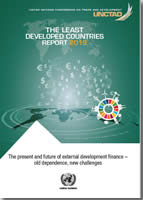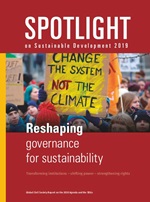Published on Tue, 2019-11-19 23:00
The Least Developed Countries (LDCs) need to use external finance to structurally transform their economies, in order to manage their aid dependency and eventually escape from it, according to the UN Conference on Trade and Development (UNCTAD). In its latest Least Developed Countries Report 2019, UNCTAD said that the LDCs account for 15 of the 20 most aid-dependent countries in the world due to persistent shortfalls in their domestic savings, among other factors. It said that the LDCs should take ownership of their development agenda and manage the allocation of external development finance in alignment with their national development priorities. |
Published on Mon, 2019-11-18 14:08
Scientific evidence and data are not at all missing in the United Kingdom, where inequality continues to rise. “Human rights researchers and practitioners working in and on the UK generally have access to a large amount of relevant and detailed data, at least when compared with other countries” recognizes Just Fair, a group of economic and social rights campaigners. That is why they find it “all the more surprising” that the UK’s Voluntary National Review (VNR) 2019, fails to disaggregate the information. “To ensure that nobody is left behind and to provide a truly meaningful picture, the government must gather and present the evidence based on all the prohibited grounds of discrimination according to both international and domestic human rights law, and this includes income and wealth disparities.” Just Fair reports that “the UK is a highly unequal society. For example, life expectancy for women born in deprived areas has declined in recent years, something utterly unacceptable in the fifth largest world economy”. |
Published on Mon, 2019-11-18 14:00
In Brazil the government of Captain Jair Bolsonaro does not make a secret of its disdain for policies and institutions aimed at supporting the people living in poverty. In its first day in office, on 1 January 2019, president Bolsonaro, dissolved the institutions responsible for the Zero Hunger policies (see Special Contribution 0.2 on the temporary extinction of CONSEA), an initiative that inspired anti-poverty policies around the world. The report by INESC documents the reduction, in the following weeks of policy spaces with civil society participation from 500 to 70. The affected monitoring bodies include the Council for Drug Policies, Council on the Rights of Persons with Disabilities, Council for the Eradication of Forced Labour, Commission for Biodiversity, and many more. Land-right defenders, trade unionist and NGO activists are being threatened and the Pastoral Commission on Land, a body of the Catholic Church, reported a dramatic increase in the first months of 2019 of murders related to land conflicts. |
Published on Sat, 2019-11-16 08:57
More than 40 Civil Society Organizations endorsed the letter supporting the draft UN debt resolution currently being negotiated in the UN General Assembly’s Economic and Financial Committee (Second Committee). |
Published on Fri, 2019-11-15 17:05
The global financial crisis has critically exposed the vulnerabilities of a liberalized, privately focused financial system. Governments worldwide intervened in such a system, providing support with an unprecedented range of measures including bailouts, nationalization of distressed financial institutions, mergers and recapitalization. However, many underlying structural conditions that led to the crisis were only partially addressed, if at all. As the past months exposed the worrisome combination of increasingly unsustainable debt levels, financial market volatility and currency instabilities, concerns for the possible eruption of another financial crisis have been on the rise. In the chapter by Kavaljit Singh, Madhyam, with the support of Stefano Prato, there are three key proposals could help preventing the next crisis while providing critical financing to sustainable development: explore the potential of development banks; restore the management of capital accounts within the standard policy toolkit of governments; and introduce a system of financial transaction taxes. |
SUSCRIBE TO OUR NEWSLETTER







